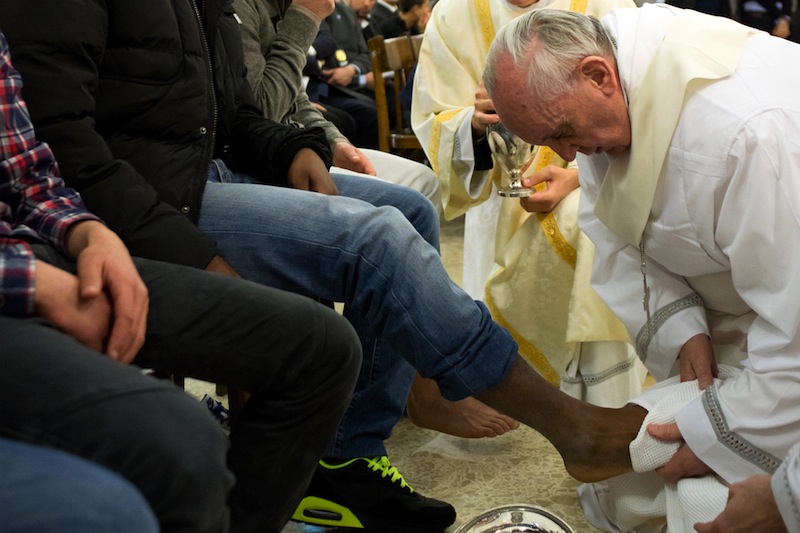I just noted two stories about the Pope this morning – one atmospheric, celebrating his 77th birthday with homeless men from Rome, the second more significant about the future direction of the Church, removing from a key committee a particularly outspoken foe of abortion and same-sex marriage who is a favorite of right-wing Catholics in the USA.
I should say first that I’m neither Catholic nor any sort of expert on Catholicism. But I’ve been a close student of the Church, in its ancient and modern incarnations, for many years. And I think I’d count myself a Catholophile. So I say all that as preface to trying to make sense of Francis’s early moves which have enthused progressive Catholics and increasingly worried conservatives.
When we say that Francis canned Cardinal Raymond Burke, Archbishop of St Louis, who is an outspoken foe of abortion and same-sex marriage, it’s important to note that this is almost certainly not about doctrine per se. I think everyone who knows this subject would agree with me that there is zero chance that the Church will change its position on abortion and basically the same for same-sex marriage – though I think Francis has signaled in this survey the possibility of real changes in the way the Church interacts with same-sex families that do exist in and out of the Catholic flock whether the Church thinks they should or not.
The issue is one of focus. As Francis has repeatedly stated, he wants a missionary Church, an evangelical Church, one living among and serving the poor and the outcast of society. And that is simply not possible as long as the Church is viewed by many almost exclusively for its militant opposition to abortion, same-sex marriage and other hot-button gender issues. He also appears to believe that these doctrines – whether we agree with them or not – can’t be understood outside of the whole of Catholic teaching. And it’s certainly true that in the American Church, to many Catholics and many non-Catholics, this has become the Church’s public face, fairly or not.
I think this is why he said:
The church’s pastoral ministry cannot be obsessed with the transmission of a disjointed multitude of doctrines to be imposed insistently. We have to find a new balance; otherwise even the moral edifice of the church is likely to fall like a house of cards, losing the freshness and fragrance of the Gospel.
It is useless to ask a seriously injured person if he has high cholesterol and about the level of his blood sugars! You have to heal his wounds. Then we can talk about everything else.
The church sometimes has locked itself up in small things, in small-minded rules The most important thing is the first proclamation: Jesus Christ has saved you. And the ministers of the church must be ministers of mercy above all.
In the 20th century the Church has had a conservative and progressive face, traditionalist/conservative on social issues (particularly in the last quarter century) but progressive on issues of race, immigration and safety net spending and protection of the poor. These are all of a piece from within the Church’s teaching.
It was a revealing – I dare say scandalous in the Church’s sense of the word – moment when much of the institutional Church in the US found itself in de facto opposition to a massive expansion of access to health care for millions of Americans because of its basically non-existent connection to abortion and its real but still marginal tie to contraception.
We have a reader here at TPM who is a traditionalist/progressive Catholic (not a common combination but not an inconsistent one either in the context of Catholic life). He’s a Francis fan and has argued to me for the essential continuity of Francis’s papacy with the papacies of John Paul II and Benedict XVI, seeing these latter two as magisterial papacies followed by the pastorally focused papacy of Francis. The argument is that that magisterial focus was necessary to ground, elaborate and contain the transformations brought about by the Second Vatican Council, making a different approach possible today.
I think there’s something to that. And this reader is highly knowledge and I go to him frequently to understand what’s happening within the Church. But I sense there’s more discontinuity here than that. Some of this seems clear to me in the dramatically different tone of Francis’ papacy. But I also sense it in Francis’ hints that the work of the Second Vatican Council remains unfinished, that many of its teachings remain to be enacted.
There are almost as many articles arguing that progressives simply don’t get Francis as there are from progressives giddy that there’s finally a Pope for maybe the first time in half a century who breathes the progressive dimensions of Catholic belief. And it is certainly true that Francis is not at all questioning the basic doctrines that undergird the opposition to abortion and gay marriage, though I’m not totally certain things that are that iron tight on the role of women in the Church. Francis is operating in a world that only lines up incompletely and obliquely with the fixed lines of secular politics. Certainly, American politics. But these changes are real. They are more than mere tone, and even tone – when changed sufficiently – can amount to changes of substance.
As I said, I’m an outsider to this debate. So I’m curious to hear from experts, Catholics and everyone else what they think.






